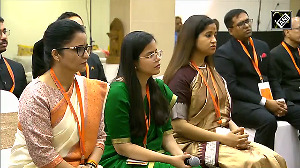The skill-set a student needs to do well in English has changed substantially over the years. An impressive reading speed and knowledge of a wide variety of words, phrases or idioms of the language is no longer as important as the ability to think and answer questions in Reading Comprehension.
However, one thing does remain the same -- this part of the paper is crucial! If you mess up Reading Comprehension, it will be difficult to clear the sectional cut-off for English in CAT. Perhaps given that MBAs are supposed to read a lot during their course and even afterwards, RC has become even more important than before in terms of its relative weightage in the paper.
In terms of trends, the number of passages has decreased from six-seven to three or a maximum of four. The length of the passages has also fallen, from over a 1,000 words per passage to anything between 500 and 800 words. The number of questions that are asked per passage has also decreased.
Other Get Ahead features:
New UK work visas decoded
Investment tips for beginners
11 ways to be a happy employee
Study Abroad: How to pick your MBA course
Wild & wacky accessories
Until a few years back, the RC section used to have a number of fairly easy questions whose answers could be found within the passage. Thus, all that one had to do is read the passage carefully, then search for the answer. This required a fairly good reading speed, the higher the better. Those with a reading speed of 500 words per minute or more typically did quite well in this section. If you could read with the requisite concentration, you were guaranteed high accuracy levels and thus, a good score in Reading Comprehension.
But not any more! Now, given the lesser number of passages and more time (CAT now gives you two and a half hours to attempt the paper), you have to attempt almost all the passages. The questions are tougher, because you may not find the answer clearly stated in the passage. The answers have to be "inferred", meaning that you have to understand the context in which the author has made a particular remark or point, and infer why he said something or what it means.
You can read the passage any number of times, if you lack the skill to make proper inferences, you will not be able to answer the question! And the troubles do not end there -- given that inferences, by nature, can be subjective, very often answer choices may appear too close to make a choice and you may be caught in two minds!
Some of the questions that appear in Reading Comprehension are as follows:
Title of the passage
The passages given in the CAT paper are typically extracts from a larger text, so no title is clearly stated. You may have to look at the answer choices and see which of the options is the best one in the given context. Do be careful, there can be more than one possible title; you have to choose the one that is "most appropriate". Try to look for a title that is neither too broad nor too specific; and one that expresses the theme that is consistent throughout the passage you have read.
Central idea
A slight variation of the previous type of question is when you are asked to choose the central idea of the passage. This might mean that you are asked to pick out a statement that correctly paraphrases the main idea of the passage or identify the author's objective in writing the passage that you have been given.
Author's tone/ attitude
This is another important type of question. You are asked to pick out tone or style the author has employed while writing the passage you have just read. The author may have been analytical -- he has analysed the cause and future repercussions of the given issue.
He could have been sarcastic -- gently poking fun at someone's view or idea. Or he may be simply descriptive or objective, describing the features of a particular place or work of art, for example.
Make sure you fully understand these terms and try to practice reading passages that are written in all these styles, so that you can recognise a particular style when you see it!
From where has the passage been taken?
You are asked as to where you think the given passage has been picked up from -- a technical journal, a newspaper or magazine or a book, for example. Remember, the clue lies in the usage of jargon and many other things. For instance, a newspaper meant for the general public is unlikely to have words or technical terms that only the people of a particular profession will understand, while a specialised journal is likely to pre-suppose the familiarity of the reader with such terms.
Who is the author?
This is another type of inferential question -- you have to state who you expect the author to be. For example, for a passage on some business issue, you could be asked whether you feel the author is a journalist, a teacher in some professional institute, a manager in some corporate etc.
You will need practice to answer such questions, the answer depends upon the style of the writer. A journalist, for example, is supposed to be unbiased and examine both sides of the particular issue, while a manager of a corporate may advance the particular view his corporate holds towards the issue under discussion.
The author's opinions
You will often find questions stating that the author is "most likely to agree or disagree with which of the following statements?" These are sometimes quite tricky as once again, these are pure inference-type questions, with no explicit answer stated in the passage.
Not only do they test your comprehension skills, but you have to put yourself in the author's shoes and try to understand his attitude or views towards the topic. Once gain, the answer could be contentious, the question statement, phrased with a "most likely" itself ensures this!
Factual questions
These are the easiest type of questions, checking whether you have grasped some particular detail in the passage; and the answer is quite clear and explicit. Although decreasing in frequency, these questions do still appear and are giveaways. The FMS entrance exam, with its longer questions, often has a number of these type of questions.
Inferential questions
In these questions, you have to make inferences based on what you have just read. The author of a point may have hinted at something or propounded an idea, without stating it explicitly. These type of questions include statements that go beyond their literal meaning or words that are used metaphorically. A good working knowledge on English is a pre-requisite to answer these questions correctly.
Over the years it has been seen that Reading Comprehension has been the only constant in CAT, while the relative weightage of other type of questions has varied considerably. This section now stresses on the candidate being able to make the correct inferences, using words appropriate to the given context and correct usage of the language.
The questions have become slightly tougher, with closer answer choices -- you will have to be more careful and practice regularly, besides ensuring a higher comfort level in English as a language.
The author is an MBA from IIM Calcutta and is employed with a management consultancy. He is also a visiting faculty with MBA coaching centres in New Delhi and a freelance writer on travel and management related issues.







 © 2025
© 2025